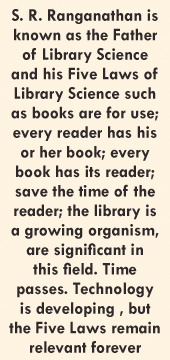
S. R. Ranganathan is known as the Father of Library Science and his Five Laws of Library Science such as books are for use; every reader has his or her book; every book has its reader; save the time of the reader; the library is a growing organism, are significant in this field.
 Time passes. Technology is developing , but the Five Laws remain relevant forever. Books are still for use, whether they’re made of wood pulp or read on an e-reader App. Even if the ‘book’ is a journal article, a blog article, a digital image or a sound file, it is for use. Someone has to step up to connect these resources with readers, not just in terms of subject matter but also in terms of format. There is a glut of information available now, and as noted by Steve Kolowich (2011) even the “digital natives” need help sorting through it all. There needs to be someone to save their time, and especially to save the time for those who have only limited access tothose resources.
Time passes. Technology is developing , but the Five Laws remain relevant forever. Books are still for use, whether they’re made of wood pulp or read on an e-reader App. Even if the ‘book’ is a journal article, a blog article, a digital image or a sound file, it is for use. Someone has to step up to connect these resources with readers, not just in terms of subject matter but also in terms of format. There is a glut of information available now, and as noted by Steve Kolowich (2011) even the “digital natives” need help sorting through it all. There needs to be someone to save their time, and especially to save the time for those who have only limited access tothose resources.
Ranganathan’s Fifth Law“The library is a growing organism” is what this article is really about.
Access to information has increased in amazing ways throughout the past couple of decades and that does not eliminate the need for librarians; it gives us even more room to do truly staggering things. As a digital librarian, you are an archivist responsible for selecting, organising, and preserving digital information in a library, including online public library materials and genealogy record collections. Digital libraries allow readers to study and they must be easy to access. Therefore, organisational skills are vital to this career. Your duties include many of the same daily tasks of a traditional librarian such as cataloguing and maintaining accurate records but you also ensure that information is licensed properly.
Moreover , you should monitor budgets and expenditure, maintain vendor relationships and supervise junior staff or assist in hiring new employees.
The role of a digital librarian in the management of DIS
Digital information system management covers the overall competencies (knowledge, know- how, skills and attitudes)necessary to create, store, analyse, organise, retrieve and disseminate digital information (text, images, sounds) in digital libraries or any type of information. To describe the roles of the digital librarian, the following concepts are introduced to understand it further.
Guardian of the information superhighway (ISH)
The information superhighway is a vision or a metaphor. It envisions a fusion of the two-way wired and wireless capabilities of telephones and networked computers with a cable TV capacity to transmit hundreds of programs. Services would be delivered by telecommunicationnetworks, cable TV networks, and the Internet and mobile communications (William et al.,1995). Infrastructure that provides band width-on- demand and information-on-demandservices are called the information superhighway.
Guardian of the global digital library/ the universal digital library
The digital library is really a transitory phase towards the universal digital library and a vast distributed information. Significantly, the digital library can be active and accessible from anywhere with increasing improved indexing, extraction and summarisation techniques.
Obviously, It will be a library without walls or national boundaries.
A digital Librarian acts as a symbiotic human-machine guru.
 The digital librarian should act as an intermediary for undertaking the task of massive digitisation of information, managing the archive and making the digitised networked information accessible to users. Digital librarians and computers depend on each other for processing and dissemination of digital information and they are both are inter- related.
The digital librarian should act as an intermediary for undertaking the task of massive digitisation of information, managing the archive and making the digitised networked information accessible to users. Digital librarians and computers depend on each other for processing and dissemination of digital information and they are both are inter- related.
Navigation, browsing and filtering
The navigation of the future would tend to integrate with the human-assisted information retrieval from the networked universe and would support the rapid information navigation and precision retrieval. The digital librarian is an expert in navigation, browsing and filtering, digital reference services and electronic information services.
Multimedia search and indexing
A multimedia digital library requires not just standard indexing and retrieval, but also sub- document indexing and summarisation techniques.
Knowledge and data mining
The digital librarian will require a limited knowledge of data mining and discovery of knowledge from digital libraries to extract the information needs of users. For this purpose, unsupervised learning techniques such as clustering, and composite term discovery techniques are useful.
Search and retrieval co-ordination
It requires comprehensive knowledge of the retrieval engines and indexing structure so that the digital librarian can achieve the goal of creating information queries with respect to the search system.
Digital information access
There is a variety of information retrieval techniques, including metadata searching, full-text document searching. In knowing what can or cannot be retrieved from the digital library information sources, the digital librarian should act as an expert in the acquisition of digital information.
